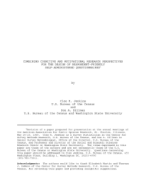
An official website of the United States government
Here’s how you know
Official websites use .gov
A .gov website belongs to an official government organization in the United States.
Secure .gov websites use HTTPS
A lock (
) or https:// means you’ve safely connected to the .gov website. Share sensitive information only on official, secure websites.
-
//
- Census.gov /
- Library /
- Census Working Papers /
- Combining Cognitive and Motivational Research Perspectives
Combining Cognitive and Motivational Research Perspectives for the Design of Respondent-Friendly Self-Administered Questionnaires
Combining Cognitive and Motivational Research Perspectives for the Design of Respondent-Friendly Self-Administered Questionnaires
Abstract
The evidence presented in this paper demonstrates that we need to pay serious attention to the visual language of self-administered questionnaires in addition to the verbal. We present twenty design principles that struggle with how to best present information to (1) motivate respondents to attempt the tasks presented to them and to (2) aid respondents to accurately answer the questionnaire once they are motivated to do so. Most of the principles have not been tested carefully on controlled designs, although we try to cite those occasions in which they have been. Principle 20 (structuring and organizing a questionnaire) is an example of a principle drawn from experimental evidence with the Decennial Census questionnaires. Most of the other principles are drawn from the results of cognitive interviews with both the Schools and Staffing Survey and the Census of Construction Industries and from the redesign of the Survey of College Graduates. The response effects of the redesigned example remain generally untested at this them. Therefore, the principles should be viewed as reasonable hypotheses for improving response, lowering item non-response, and improving accuracy. A major reason for writing this paper was to encourage experimental research on these issues.
Others in Series
Working Paper
Working Paper
Working Paper
Share
Related Information
Some content on this site is available in several different electronic formats. Some of the files may require a plug-in or additional software to view.
 Yes
Yes
 No
NoComments or suggestions?


Top

